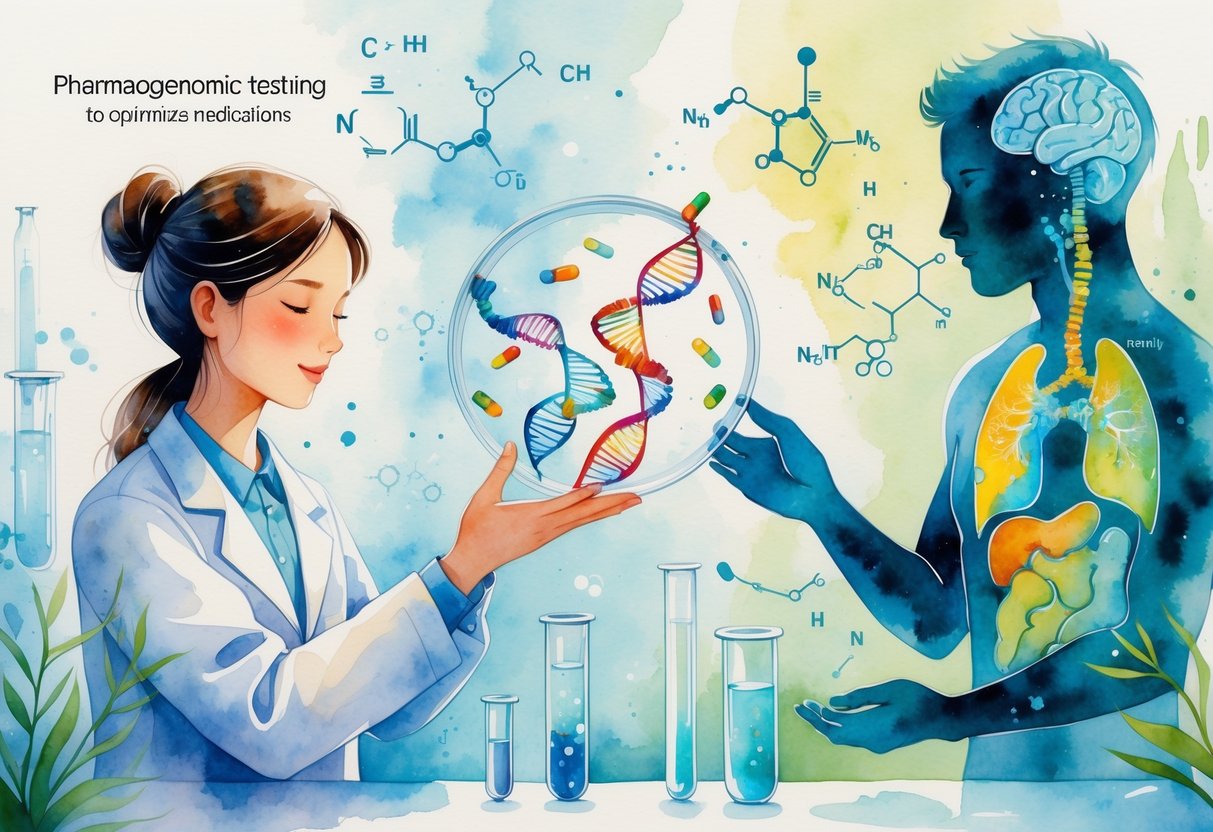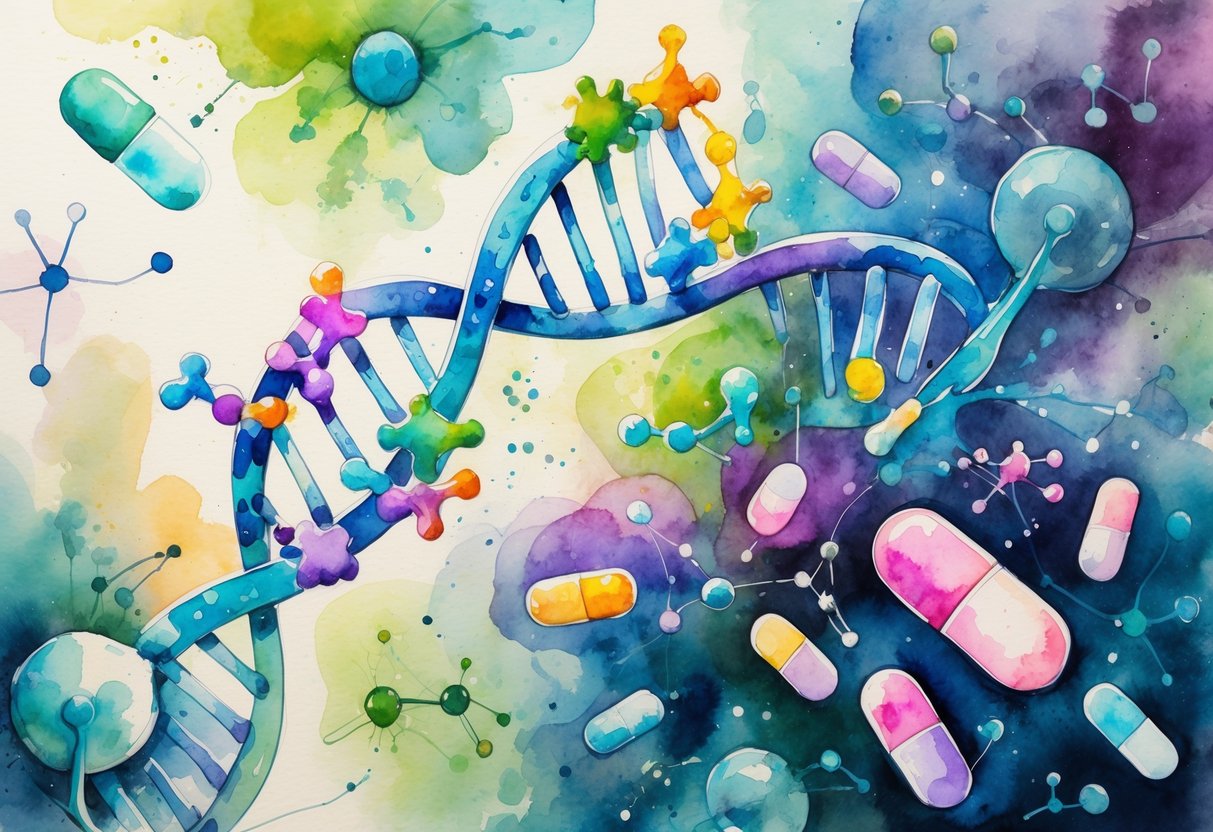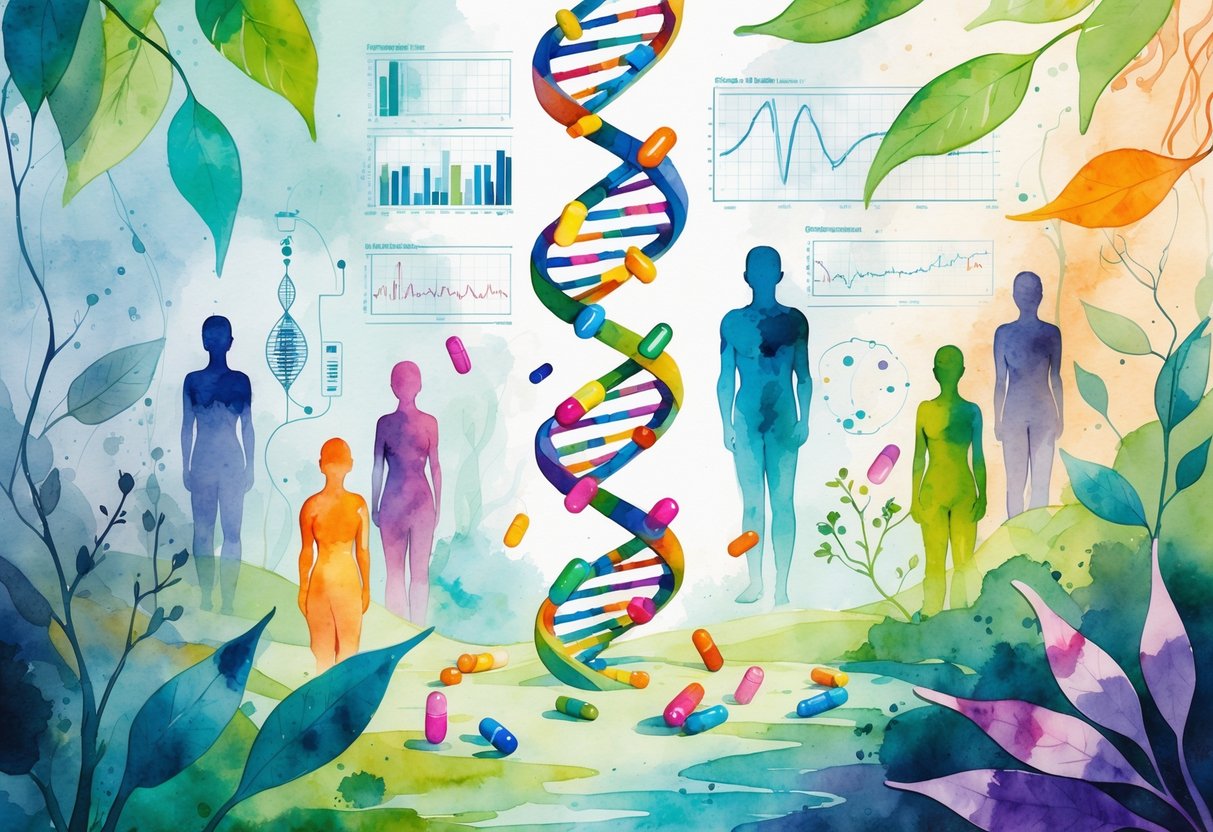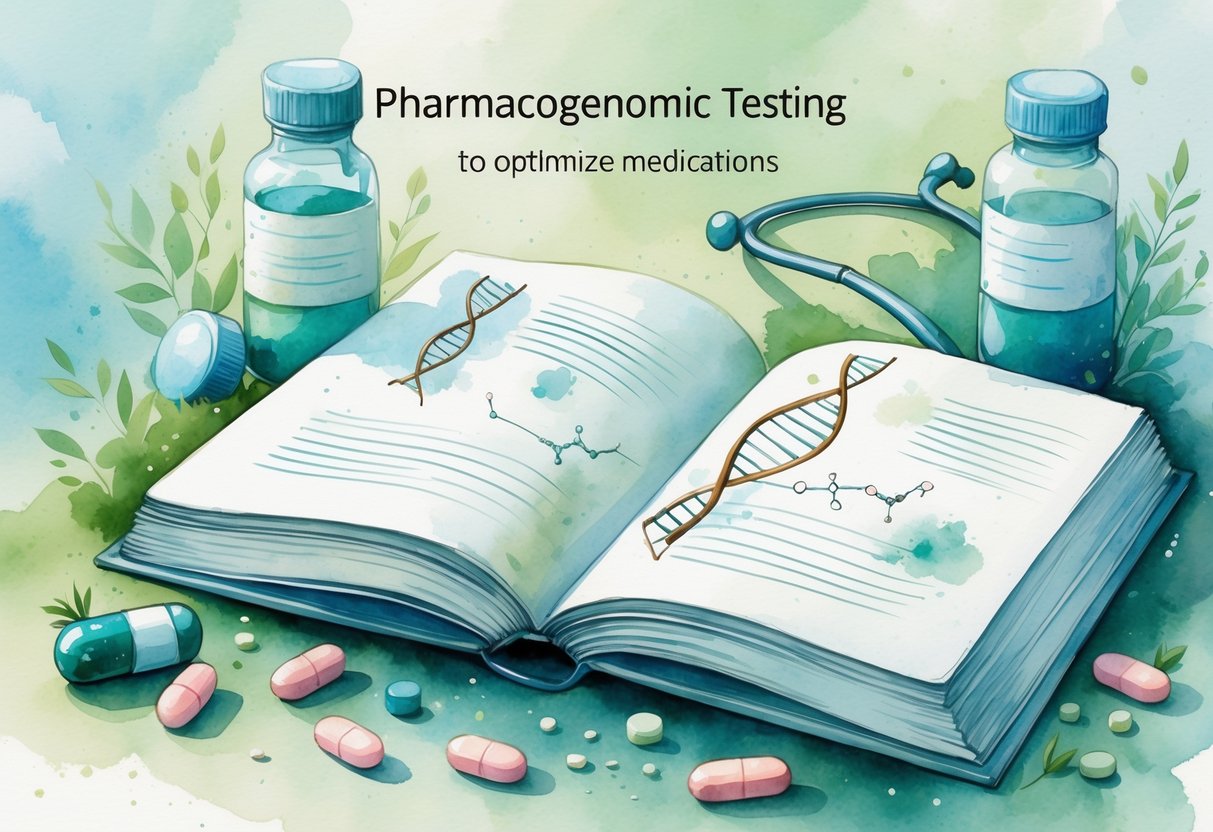Many people struggle with finding the right medication that works without causing unwanted side effects. Pharmacogenomic testing uses your genetics to help predict the way you will react to a drug, offering a scientific approach to medication selection. This testing analyzes how specific genes affect how the body processes different medications.

For most patients, pharmacogenomic testing can be worth the investment because it helps doctors choose more effective medications while reducing the risk of serious side effects. By optimizing medication selection and dosing, pharmacogenomic testing can improve treatment outcomes and lead to better symptom management and faster recovery times.
The value of this testing becomes clear when considering that traditional trial-and-error approaches to medication can take months and expose patients to unnecessary risks. Pharmacogenomic testing assesses how genes affect individual responses to medications, enhancing personalized treatment decisions across many medical specialties, from psychiatry to cardiology.
Key Takeaways
- Pharmacogenomic testing analyzes your genes to predict how you will respond to specific medications before you take them
- The testing can significantly reduce medication side effects and improve treatment success rates compared to traditional approaches
- Most patients find the investment worthwhile due to faster recovery times and fewer medication changes needed
Understanding Pharmacogenomic Testing

Pharmacogenomic testing analyzes genetic variants to predict how individuals respond to medications, while specific genes affect drug metabolism and effectiveness in predictable ways.
What Is Pharmacogenomics?
Pharmacogenomics combines pharmacology and genomics to study how genes influence medication responses. This field examines the relationship between genetic makeup and drug effectiveness.
More than 98% of people carry genetic variants that could affect their response to commonly prescribed medications. These variants can determine whether a drug works well, causes side effects, or requires dose adjustments.
The science focuses on specific genes that control drug processing in the body. Some people metabolize certain medications too quickly, making them less effective. Others process drugs too slowly, increasing the risk of side effects.
Key areas where pharmacogenomics applies include:
- Antidepressant medications
- Blood thinners like warfarin
- Pain medications including codeine
- Cancer treatments
- Heart medications
How Pharmacogenomic Testing Works
Pharmacogenomic testing examines DNA variations to determine which medications may work better and at what dosages. The process typically involves a simple cheek swab or blood sample.
Laboratory analysis identifies specific genetic variants that affect drug metabolism. The test looks at genes responsible for processing medications in the liver and other organs.
Results are interpreted by trained pharmacists or physicians who understand pharmacogenomics. They review the genetic data alongside medical history and current medications.
The testing process usually takes 1-2 weeks for results. Once available, the information can guide medication choices for life since genetic makeup does not change.
Testing typically examines genes such as:
- CYP2D6 (affects many antidepressants)
- CYP2C19 (influences blood thinner response)
- VKORC1 (impacts warfarin dosing)
Key Genetic Variants Impacting Drug Response
Genetic variants create different metabolizer types that affect drug processing speeds. These categories help predict how individuals will respond to specific medications.
Poor metabolizers process certain drugs very slowly, leading to higher drug levels and increased side effects. They often need lower doses or alternative medications.
Rapid metabolizers break down drugs quickly, potentially making standard doses less effective. These patients may require higher doses or more frequent dosing.
Normal metabolizers process medications at expected rates and typically respond well to standard dosing recommendations.
The CYP2D6 gene shows significant variation, with over 100 known variants affecting drug metabolism. Approximately 7% of people are poor metabolizers for this gene.
VKORC1 variants can require warfarin dose adjustments of 20-60% from standard recommendations. These genetic differences explain why some patients need careful monitoring with blood thinners.
HLA-B variants can predict severe allergic reactions to medications like carbamazepine and abacavir, potentially preventing life-threatening side effects.
Personalizing Medication Through Pharmacogenomics

Pharmacogenomics tailors drug therapies to genetic profiles, transforming how medications work for each person. Genetic variations affect how quickly the body processes drugs, how well they work, and what side effects occur.
Role of Genes in Drug Metabolism
Genes control the enzymes that break down medications in the body. The most important enzyme system is cytochrome P450, which processes about 75% of all prescription drugs.
Different genetic variants create fast, normal, or slow metabolizers. Fast metabolizers break down drugs quickly, often needing higher doses. Slow metabolizers process drugs slowly, making standard doses too strong.
Key metabolizer types:
- Ultra-rapid: Very fast drug breakdown
- Extensive: Normal drug processing
- Intermediate: Slower than normal processing
- Poor: Very slow or no drug breakdown
The CYP2D6 gene affects how people process antidepressants, pain medications, and heart drugs. About 7% of people are poor metabolizers for this gene.
CYP2C19 variations impact how the body handles blood thinners like clopidogrel. Poor metabolizers get less protection from heart attacks because they cannot activate the drug properly.
Drug Response and Efficacy
Pharmacodynamics describes how drugs interact with their targets in the body. Genetic differences in drug targets change how well medications work.
Pharmacogenomic testing uses DNA to predict medication responses, helping doctors choose the right drugs and doses. This testing covers antidepressants, pain relievers, and specialized treatments.
Warfarin dosing depends on two genes: CYP2C9 and VKORC1. People with certain variants need much lower doses to avoid dangerous bleeding. Standard dosing can be off by 50% or more without genetic guidance.
Common drug-gene pairs:
- Clopidogrel and CYP2C19
- Warfarin and CYP2C9/VKORC1
- Codeine and CYP2D6
- Simvastatin and SLCO1B1
Some people cannot convert codeine into morphine due to CYP2D6 variants. These patients get no pain relief from codeine-based medications.
Preventing Adverse Drug Reactions
Pharmacokinetics involves how the body absorbs, distributes, and eliminates drugs. Genetic variants can cause dangerous drug levels or unexpected reactions.
Pharmacogenomic testing helps reduce side effects and optimize dosing. This approach prevents many serious adverse drug reactions before they occur.
The HLA-B*5701 gene variant causes severe skin reactions to abacavir, an HIV medication. Testing prevents life-threatening hypersensitivity reactions in about 6% of patients.
High-risk genetic variants:
- HLA-B*5701: Abacavir hypersensitivity
- DPYD variants: Fluorouracil toxicity
- TPMT variants: Thiopurine toxicity
- UGT1A1*28: Irinotecan toxicity
DPYD gene testing prevents severe toxicity from cancer drugs like fluorouracil. Patients with certain variants can experience dangerous drops in white blood cells without dose adjustments.
Stevens-Johnson syndrome and toxic epidermal necrolysis are rare but deadly skin reactions. Several HLA gene variants predict these reactions to specific medications like carbamazepine and allopurinol.
Common Genes and Drugs Influenced by Pharmacogenomics

Several key genes control how the body processes medications, with CYP2D6 and CYP2C19 enzymes affecting numerous common drugs. HLA genes influence severe allergic reactions to specific medications like carbamazepine and allopurinol.
CYP2D6 and CYP2C19 Enzymes
The CYP2D6 and CYP2C19 genes produce enzymes that break down many medications in the liver. These enzymes affect how quickly or slowly a person processes certain drugs.
CYP2D6 variations impact multiple drug classes including antidepressants, antipsychotics, and pain medications. People with different CYP2D6 variants may be poor, normal, or ultra-rapid metabolizers.
Common CYP2D6-affected medications:
- Tramadol and other opioid pain relievers
- Antidepressants like paroxetine and fluoxetine
- Antipsychotic medications
CYP2C19 primarily affects antiplatelet therapy and acid-blocking medications. Genetic testing for CYP2C19 helps guide clopidogrel dosing for heart patients.
Poor CYP2C19 metabolizers may not get full benefits from clopidogrel. Fast metabolizers might need higher doses of proton pump inhibitors.
HLA and Drug Hypersensitivity
HLA genes control immune system responses and influence severe drug allergic reactions. Certain HLA variants significantly increase the risk of dangerous skin reactions.
HLA-B testing is crucial before starting carbamazepine in some populations. People with specific HLA-B variants face higher risks of Stevens-Johnson syndrome.
Key HLA-drug interactions:
- HLA-B*5701 and allopurinol hypersensitivity
- HLA-B*1502 and carbamazepine reactions
- HLA-A*3101 and phenytoin sensitivity
Testing for these variants helps doctors avoid prescribing dangerous medications. The reactions can be life-threatening without proper screening.
Examples of Impacted Medications
Pharmacogenomic guidelines exist for 99 different drugs across multiple medical specialties. These medications span from mental health treatments to cancer therapies.
TPMT gene affects azathioprine and other immunosuppressive drugs. Patients with low TPMT activity need much smaller doses to avoid severe side effects.
VKORC1 gene influences warfarin dosing for blood clot prevention. Genetic variants help determine starting doses and reduce bleeding risks.
Mental health medications show strong genetic influences. Many antidepressants depend on CYP2D6 and CYP2C19 for proper dosing and effectiveness.
Pain management also relies heavily on genetic factors. Tramadol effectiveness varies greatly based on CYP2D6 status, with some patients getting no pain relief.
Testing Strategies and Clinical Implementation

Doctors can choose between different testing approaches and timing strategies when ordering pharmacogenomic tests. Clinical implementation involves multiple stakeholders and requires careful consideration of which genes to test and when to perform the testing.
Panel Testing vs. Single-Gene Testing
Panel testing examines multiple genes at once, while single-gene testing focuses on one specific gene. Most healthcare providers prefer panel testing because it provides more comprehensive information about drug metabolism.
Panel Testing Benefits:
- Tests 10-30+ genes in one sample
- More cost-effective than multiple single tests
- Provides lifetime results for many medications
- Identifies unexpected genetic variants
Panel testing typically costs $200-500 but covers dozens of medications. Single-gene testing costs $100-200 per gene but only applies to specific drugs.
The Clinical Pharmacogenetics Implementation Consortium recommends multi-gene panels for most clinical situations. Panels include genes like CYP2D6, CYP2C19, and SLCO1B1 that affect many common medications.
Single-gene testing makes sense when doctors need results for one specific medication quickly. This approach works best for urgent clinical decisions.
Preemptive and Reactive Pharmacogenomic Testing
Reactive testing happens after a doctor prescribes a medication, while preemptive testing occurs before any prescriptions are written. Each approach has different advantages for patient care.
Reactive Testing:
- Ordered when starting specific medications
- Results available in 1-3 days
- Immediate clinical application
- Lower upfront costs
Preemptive Testing:
- Results stored in medical records
- Available for future prescriptions
- No delays when starting medications
- Higher initial investment
Preemptive testing strategies work better in hospitals where patients receive multiple medications. Studies show 91-99% of patients have genetic variants that affect at least one commonly prescribed drug.
Reactive PGX testing suits primary care settings where doctors prescribe specific medications infrequently. The choice depends on patient population and medication patterns.
Clinical Guidelines and Interpretation
Professional organizations provide detailed guidelines for interpreting pharmacogenomic test results. These guidelines help doctors make medication decisions based on genetic information.
The Clinical Pharmacogenetics Implementation Consortium publishes evidence-based recommendations for 21 gene-drug pairs. Their guidelines classify genetic variants as normal, intermediate, or poor metabolizers.
Key Interpretation Categories:
- Normal metabolizer: Standard dosing recommended
- Intermediate metabolizer: Consider dose reduction
- Poor metabolizer: Avoid drug or use alternative
- Ultrarapid metabolizer: Higher doses may be needed
Electronic health records can integrate PGX results with clinical decision support systems. These tools alert doctors when patients have genetic variants affecting prescribed medications.
Implementation challenges include interpreting complex results and training healthcare providers. Many hospitals use pharmacists to help doctors understand genetic test results and make appropriate medication changes.
Evaluating the Worth of Pharmacogenomic Testing

Most studies show pharmacogenomic testing is cost-effective for many medications, but the value depends on individual factors like age, medical history, and insurance coverage. Key barriers include limited insurance reimbursement and gaps in healthcare provider knowledge.
Who Should Consider PGx Testing?
Patients taking certain high-risk medications benefit most from pharmacogenomic testing. Those prescribed warfarin, clopidogrel, or antidepressants should strongly consider testing since these drugs have well-established genetic guidelines.
People with a history of severe drug reactions or treatment failures are ideal candidates. Multiple medication trials often cost more than upfront genetic testing.
Younger patients may see greater lifetime value from testing. Genetic information remains useful throughout a person’s life for future prescriptions.
Patients starting psychiatric medications like antidepressants benefit significantly. Studies show 9 of 11 antidepressant analyses found testing cost-effective.
Those with chronic conditions requiring long-term medication management should consider testing. The genetic information helps optimize multiple drugs over time.
Cost-Effectiveness and Insurance Coverage
Most pharmacogenomic studies favor testing as cost-effective, with 71% of 108 studies supporting its economic value. Testing costs have dropped significantly, making it more accessible.
Medicare and Medicaid provide limited coverage for pharmacogenomic testing in specific circumstances. Most private insurers cover testing only for certain medications or conditions.
Patients generally find testing worthwhile when costs are lower or covered by insurance. Many testing companies offer payment plans based on income levels.
The value varies by medication type:
- Clopidogrel testing: 22 of 23 studies showed cost-effectiveness
- Warfarin testing: Only 7 of 16 studies demonstrated value
- HLA testing: 15 of 26 studies supported cost-effectiveness
Barriers and Limitations
Electronic medical record systems often fail to store or share genetic information between providers. This limits the long-term value of testing results.
Healthcare providers frequently lack training in interpreting pharmacogenomic results. Many doctors remain unfamiliar with how to use genetic information for prescribing decisions.
Geographic location affects testing value. Studies conducted in Asia are less likely to find testing cost-effective compared to Western countries.
Insurance reimbursement policies remain inconsistent across different payers. This creates financial barriers for many patients who could benefit from testing.
The timing of testing matters but evidence remains mixed. Preemptive testing before starting medications may offer more value than reactive testing after problems occur.
Future Directions and Broader Applications

Pharmacogenomic testing is expanding beyond basic medication selection into specialized medical fields and complex treatment scenarios. The technology shows particular promise in pain management protocols and psychiatric medication optimization, where traditional trial-and-error approaches often delay effective treatment.
Advances in Personalized Medicine
Pharmacogenomics represents a cornerstone of personalized medicine, with researchers developing more sophisticated testing methods. Advanced technologies now include multigene panels that analyze multiple genetic markers simultaneously.
Artificial intelligence integration helps doctors interpret complex genetic data more effectively. These systems can predict drug responses with greater accuracy than single-gene tests.
Key technological improvements include:
- Next-generation sequencing for comprehensive genetic analysis
- Real-time clinical decision support systems
- Integration with electronic health records
- Point-of-care testing devices
The FDA continues approving new pharmacogenomic-guided therapies across medical specialties. Recent statistics show that 91-99% of patients have at least one genetic variant that affects medication response.
Cost reductions make testing more accessible to diverse patient populations. Healthcare systems report significant savings when implementing comprehensive pharmacogenomic programs.
Expanding Use in Pain Management and Mental Health
Pain management represents a critical frontier for pharmacogenomic applications. Genetic testing helps identify patients who metabolize opioids too quickly or slowly, reducing risks of inadequate pain relief or dangerous side effects.
CYP2D6 gene variants significantly affect codeine metabolism. Patients with rapid metabolism face toxicity risks, while poor metabolizers receive insufficient pain relief.
Mental health treatment benefits substantially from pharmacogenomic guidance. Antidepressants show variable effectiveness based on genetic factors affecting serotonin pathways and drug metabolism.
Common genetic markers in psychiatry include:
- CYP2D6 for antidepressant metabolism
- CYP2C19 for antianxiety medications
- COMT gene variants affecting dopamine processing
- Serotonin transporter gene polymorphisms
Clinical trials demonstrate that pharmacogenomics-guided therapy reduces adverse drug reactions by approximately 30% in psychiatric patients. This improvement helps patients find effective treatments faster and reduces medication switching.
Psychiatrists increasingly use genetic testing before prescribing antidepressants, particularly for treatment-resistant cases. The approach shows promise for reducing the typical 6-8 week trial periods common with traditional prescribing methods.
Frequently Asked Questions

Pharmacogenomic testing analyzes genetic variants to determine how individuals respond to specific medications. This testing can help doctors choose safer drugs, adjust dosages, and reduce harmful side effects for better treatment outcomes.
What are the potential benefits of pharmacogenomic testing for personalizing medication regimens?
Pharmacogenomic testing offers several key benefits for personalized medicine. The testing increases drug effectiveness by identifying which medications work best for each person’s genetic makeup.
Patients often experience fewer side effects when doctors use genetic information to select medications. The testing also helps determine the right dose for each person based on how their body processes drugs.
Healthcare providers can make more informed decisions about medication choices. This leads to faster treatment success and less trial-and-error with different drugs.
The testing is especially helpful for people who have had bad reactions to medications before. It can prevent future problems by showing which drugs to avoid.
How does pharmacogenomic testing improve drug efficacy and safety?
The testing examines DNA variations that affect how the body responds to medications. Some people break down drugs too quickly, making them less effective.
Others process medications too slowly, which can cause dangerous buildup in the body. The genetic information helps doctors adjust doses to match each person’s metabolism.
Pharmacogenomic results show the likelihood of responding well to specific medications. This information helps avoid drugs that may not work for certain genetic profiles.
The testing also identifies increased risks for serious side effects. Doctors can choose alternative medications that are safer for each patient’s genetic makeup.
Can pharmacogenomic testing reduce the risk of adverse drug reactions?
Pharmacogenetic testing can help avoid adverse drug reactions by identifying genetic risk factors before starting treatment. The testing reveals which medications may cause harmful reactions in specific patients.
Studies show that pharmacogenetic testing significantly reduces adverse drug reactions when used before starting medications. This is especially important for drugs with known genetic influences on safety.
The testing is particularly valuable for medications that commonly cause severe reactions. Examples include certain heart medications, blood thinners, and cancer drugs.
Patients with a history of medication problems benefit most from this testing. The genetic information helps doctors avoid repeating past adverse reactions with similar drugs.
What criteria should be considered when deciding to undergo pharmacogenomic testing?
Patients should consider testing if they have experienced bad reactions to multiple medications in the past. Those starting medications known to have genetic influences on effectiveness should also consider testing.
People with conditions requiring long-term medication management benefit from early testing. This includes mental health conditions, heart problems, and chronic pain management.
The testing should be considered before initiating medications with known genetic influences on safety or effectiveness. Family history of medication problems may also indicate potential benefit.
Cost and insurance coverage are practical factors to consider. Some insurance plans cover testing for specific medical conditions or medications.
The patient’s willingness to share genetic information with healthcare providers is another important consideration. Results become part of the medical record for future use.
Are there specific medications or conditions that benefit most from pharmacogenomic testing?
Multiple medical specialties use pharmacogenomic testing for different types of medications. Mental health medications like antidepressants show significant benefits from genetic testing.
Heart medications including blood thinners like warfarin and clopidogrel have well-established genetic guidelines. Cancer drugs often require genetic testing to prevent serious side effects.
Pain medications, especially opioids like codeine and tramadol, work differently based on genetic factors. Some people cannot convert these drugs into their active forms.
Seizure medications like carbamazepine can cause dangerous skin reactions in certain genetic groups. Testing helps identify patients at risk before starting treatment.
Organ transplant medications require genetic testing to determine proper dosing. This prevents rejection while avoiding toxic levels of immunosuppressive drugs.
What is the process for obtaining and interpreting pharmacogenomic test results?
The testing process typically involves analyzing genes through a simple blood draw or cheek swab. Healthcare providers order the test and collect the sample in their office.
Laboratory analysis usually takes one to two weeks to complete. The results show how different genes affect medication processing and response.
Healthcare providers interpret the results and make medication recommendations. The results help providers choose the safest and most effective medications for each patient.
Results typically include specific drug recommendations with dosing guidance. Some medications may be labeled as preferred, use with caution, or avoid completely.
The genetic information remains useful throughout a person’s lifetime. Healthcare providers can reference past results when prescribing new medications in the future.